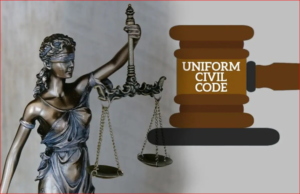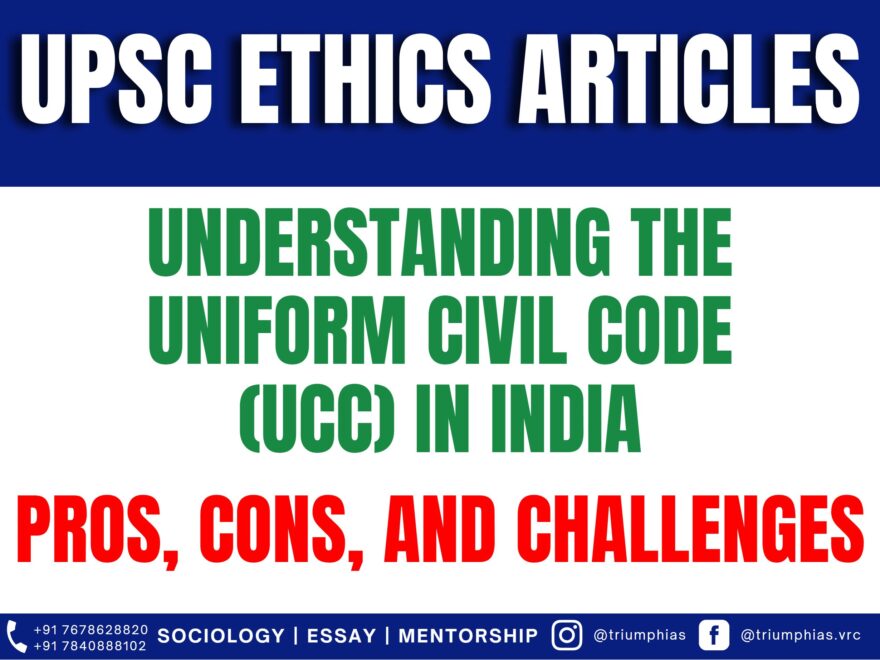Uniform Civil Code
(Relevant for Ethics, Integrity and Aptitude)

The Law Commission of India has initiated a request for views and proposals from the public regarding the Uniform Civil Code (UCC). The UCC has been a subject of intense debate and political controversy in India. Previously, the Law Commission held the position that the UCC was neither necessary nor desirable. The UCC proposes to replace the personal laws of different religious communities with a unified set of laws applicable to all citizens.
WHAT is UCC?
The Uniform Civil Code (UCC) is referenced in Article 44 of the Indian Constitution, which falls under the Directive Principles of State Policy. These principles serve as guiding principles for the state’s policy-making, although they are not legally enforceable.
The UCC has garnered support from some individuals who see it as a means to foster national unity and promote gender equality. However, it has also faced opposition from those who view it as a threat to religious freedom and cultural diversity.
Currently, the state of Goa is the only region in India that has implemented a UCC. It has retained its common family law known as the Goa Civil Code, which has been in place since its liberation from Portuguese rule in 1961. In contrast, the rest of India follows different personal laws based on religious or community affiliations.
Challenges in Implementing UCC
- India is a nation characterized by its multitude of religions, cultures, and traditions. Many religious and minority groups perceive the Uniform Civil Code (UCC) as a violation of their religious freedom and cultural autonomy.
- They express concerns that the UCC might impose a dominant or uniform law that disregards their unique identities and diverse practices.
- One of the key challenges in implementing the UCC is the absence of political will and consensus among the government, legislature, judiciary, and civil society.
- There is a lack of agreement and unity regarding the initiation and execution of the UCC.
- Implementing the UCC would necessitate an extensive undertaking, involving the drafting, codification, harmonization, and rationalization of the diverse personal laws and practices observed in India.
- Furthermore, it would require broad consultations and active participation from various stakeholders, including religious leaders, legal experts, women’s organizations, and others.
Benefits of UCC
- The Uniform Civil Code (UCC) has the potential to foster national integration and secularism by establishing a shared identity and a sense of unity among all citizens. It would address the communal and sectarian conflicts that arise due to the existence of distinct personal laws.
- By ensuring gender justice and equality, the UCC would eradicate the discrimination and oppression faced by women under various personal laws. It would guarantee equal rights and status for women in crucial matters like marriage, divorce, inheritance, adoption, maintenance, and more.
- The UCC aims to simplify and streamline the legal system by eliminating the complexities and contradictions that stem from multiple personal laws. It would harmonize civil and criminal laws, eliminating any anomalies and loopholes that arise due to the diverse personal laws.
- Furthermore, the UCC would modernize and reform outdated and regressive practices prevalent in certain personal laws. It would eliminate practices that infringe upon human rights and values enshrined in the Constitution of India, such as triple talaq, polygamy, child marriage, and others.
The proposed UCC should embody the multicultural essence of India and safeguard its rich diversity. Emphasizing unity is crucial, while recognizing the significance of maintaining cultural variations. The Indian Constitution permits both integrationist and limited multicultural approaches to accommodate diverse cultural backgrounds. The Indian Constitution upholds the right to cultural autonomy and strives for cultural inclusiveness. The primary objective should be to establish a fair code that upholds equality and justice.

To master these intricacies and fare well in the Sociology Optional Syllabus, aspiring sociologists might benefit from guidance by the Best Sociology Optional Teacher and participation in the Best Sociology Optional Coaching. These avenues provide comprehensive assistance, ensuring a solid understanding of sociology’s diverse methodologies and techniques.
Best Sociology Optional Teacher, Best Sociology Optional Coaching, Sociology Optional Syllabus, Uniform Civil Code, UCC, Indian Constitution, Personal Laws, Religious Freedom, Cultural Diversity, National Integration, Gender Equality, Challenges, Benefits, Indian Law.
Follow us :
🔎 https://www.instagram.com/triumphias
🔎https://www.youtube.com/c/TriumphIAS
https://t.me/VikashRanjanSociology
Find More Blogs
| Karl Marx- Historical Materialism | |
| Position of Women In the Modern Indian Society | Sociology: Social system and pattern variables |



